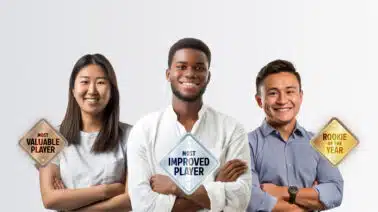The Sharing Economy. The Learning Economy. The On-Demand Economy. Hybrid Jobs. The Skills Gap. The Talent Shortage. Interviewless Hiring. Lifelong Learning. Competency-Based Education. Disruptive Innovation. Growth Mindset. What in the world is going on? If you’re either preparing to enter the workforce for the first time, are facing the need to skill up to remain competitive in your current role, or are contemplating a career change, you might be feeling a little overwhelmed right now.
The Future of Work
The Future of Work is a phrase you’ve likely encountered if you’re trying to figure out what’s going on when it comes to education and the hiring landscape. Josh Bersin (Principal and Founder, Bersin by Deloitte) noted 48 million Google hits on the phrase when researching a recent article on the subject. The title of his article, published recently in Forbes, should offer you a bit of hope if you’re someone who isn’t quite sure what exactly the future holds, or expects of you:
The Future Of Work: It’s Already Here — And Not As Scary As You Think
The gist of his article—which is highly recommended for its rigor, depth, and insight—is pretty well summed up in this quote:
The most important skill to build in today’s “future of work” is what you may call “personal reinvention” – the ability to let go of who you are today and recreate yourself as jobs around you change.
An even more succinct rendering might be Bersin’s answer to the question “Are jobs going away?”
“NO. Jobs are NOT going away, they’re just changing.”
This is a critical bit of wisdom to absorb and internalize. We’re not being replaced, and we’re not all going to be out of work. Be we are going to need to make some adjustments.
Skills and Education
What does this all mean for you—you, who are looking at your own future of work? In simplest form, you might say it’s a matter of choosing one of two paths forward. We can find in a recent Deloitte research report entitled “Essential Skills for Working in the Machine Age” the following passage:
There’s never been a better time to be a worker with special skills or the right education, because these people can use technology to create and capture value. However, there’s never been a worse time to be a worker with only ‘ordinary’ skills and abilities to offer, because computers, robots, and other digital technologies are acquiring these skills and abilities at an extraordinary rate.
Clearly, the first option is the more desirable one, but what does it mean to be—and how do you go about becoming—a worker with “special skills” and “the right education?”
A recent article in the Harvard Business Review entitled Hybrid Jobs Call for Hybrid Education provides some valuable analysis of the current learning and hiring landscapes, and a clear-eyed vision of the kind of education that will produce—and support—employees of the future. Author Joseph E. Aoun details what we might call “the right education” as having “three key elements: thematic study across disciplines, project-based learning, and experiential opportunities.”
Embracing learning experiences that incorporate all three of these elements means mastering in-demand skills relevant to multiple fields, building up a portfolio of work that demonstrates your skills, and accruing hands-on experience that can directly translate to future work opportunities.
Lifelong Learning
If we presume the efficacy of the kind of education Aoun details above, we can then extend our thinking to take in the idea of lifelong learning. In a recent Boston Globe article entitled Smart Machines and The Future of Jobs, Jeffrey D. Sachs (University Professor and Director of the Center for Sustainable Development at Columbia University) delivers the following wonderful soundbite:
In an age of disruptive technology, we should plan for disruption.
He follows this by stating that:
Changing jobs should be regarded as normal; training and skill upgrading should be lifelong, and health care and other benefits should follow workers, not jobs.
This essentially echoes Bersin’s sentiments. So what prescriptive conclusions can we draw from everything we’ve discussed here? Namely, that successfully preparing for your future requires a commitment to lifelong learning, and to continually refreshing your skills. To do this requires embracing learning systems and opportunities that provide cutting-edge curriculum, flexible scheduling, hands-on learning, and efficient and compact structures. You’ll need to learn and relearn on an ongoing basis, and you’ll need steady and reliable access to learning solutions that teach you the skills you need to know, when you need to know them.
Transferable Skills
Note the focus on skills here, not roles. This isn’t about preparing for a particular role. It’s about mastering in-demand skills, and then leveraging that mastery to ensure you continue to find rewarding employment. Part 2 of a series from The Future of Work is Human entitled “Your services are no longer required” includes the following quote from Andreas Schleicher (OECD Director for Education and Skills):
The skills that are the biggest differentiators today are creative thinking and analysis — transferable skills that are not specific to one job.
There are two ways to understand transferable skills. A recent post from Monster.com highlights what might now be thought of as the more “traditional” approach, which was perhaps most famously codified (as the Monster article notes) in the book “What Color Is Your Parachute? A Practical Manual for Job-Hunters and Career-Changers” by Richard Nelson Bolles. In this approach, “transferable skills”:
…can be broken down into three categories: people (communicating, teaching, coaching and supervising), data (record keeping, researching, translating and compiling data) and things (operating computers/equipment, assembling and repairing).
A more contemporary understanding of transferable skills should incorporate the ubiquity of technology, and its field-agnostic omnipresence. As a very simple example, virtually any modern business or organization has, or needs, a website, and an app. Thus, the ability to build a website or develop an app is a transferable skill, because it is not specific to one job (assuming, of course, that we define “job” as a role with a particular organization).
Growth Mindsets
To circle all the way back to where we started, we were trying to provide some guidance for anyone feeling overwhelmed. The proliferation of complicated and confusing terms and concepts that permeate theories about the future of work can leave just about any job-seeker feeling pretty anxious, and our goal here is to cut through the chatter and provide a distilled message about how to proceed.
Of all the terms we collected in that first paragraph, possibly the most important one is growth mindset. Kathleen Mullaney (VP, Careers & People Ops) gave a talk at SXSW last year about this very subject, and wrote the following:
We encourage children to adopt growth mindsets. Yet as adults we tend toward fixed mindsets, hindering our potential to adapt. This age bias widens the gap between limited tech talent and global job growth. People from all walks of life can gain new skills.
Whether you’re preparing to enter the workforce for the first time, are facing the need to skill up to remain competitive in your current role, or are contemplating a career change, success begins with learning. And there’s no time like the present to begin! All it takes is a growth mindset, and a place to learn.




